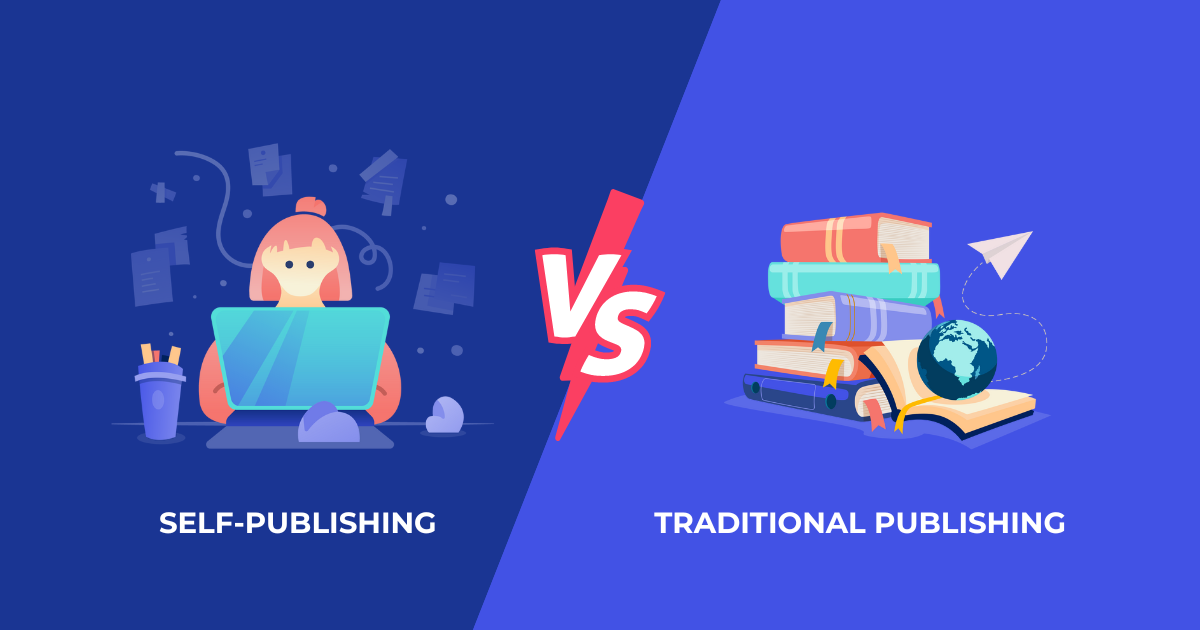Choosing the right publishing path can feel like a daunting task. With so many factors to consider, it’s essential to weigh the pros and cons of each option. Whether you’re a seasoned writer or a first-time author, understanding the differences between self-publishing and traditional publishing will help you make an informed decision that aligns with your goals.
Understanding Traditional Publishing
Traditional publishing is the age-old route where authors work with established publishing houses. If you land a deal, the publisher handles everything from editing and design to distribution and marketing. But is this the right choice for you? Let’s explore the pros and cons.
The Pros of Traditional Publishing
Professional Editing and Design: One of the biggest perks of traditional publishing is the professional touch your book receives. From top-notch editing to eye-catching cover design, the publisher takes care of everything to ensure your book is market-ready.
Wider Distribution: Traditional publishers have established networks that can get your book into bookstores, libraries, and online platforms. This means more visibility and a potentially broader audience.
Credibility: Having a well-known publisher’s name on your book can add credibility, making it easier to secure media coverage, book reviews, and speaking engagements.
Advance Payments: Traditional publishers often offer advance payments to authors, which can provide financial support while you work on your book.
The Cons of Traditional Publishing
Limited Creative Control: When you sign with a traditional publisher, you’re often giving up some control over your book. They might make changes to the content, cover, and title to fit their market strategy.
Lengthy Process: Traditional publishing can be a slow process, sometimes taking years from the time you submit your manuscript to the book’s release.
Lower Royalties: While you might receive an advance, the royalties from traditional publishing are typically lower than what you could earn through self-publishing.
Exploring Self-Publishing
Self-publishing has grown in popularity, offering authors the chance to take full control of their work. But with great power comes great responsibility. Here’s what you need to know about self-publishing.
The Pros of Self-Publishing
Creative Freedom: Self-publishing allows you to maintain complete control over your content, cover design, and marketing strategy. Your book is truly your vision from start to finish.
Higher Royalties: As a self-published author, you can earn higher royalties per book sold since there are no middlemen taking a cut.
Faster Publication: If you’re eager to get your book out into the world, self-publishing is the way to go. You can publish your book within days or weeks, depending on how ready you are.
Niche Markets: Self-publishing is ideal for authors who are writing for niche markets or want to test the waters with a smaller audience before committing to a larger publishing effort.
The Cons of Self-Publishing
Upfront Costs: Unlike traditional publishing, self-publishing requires you to cover all the costs, including editing, cover design, and marketing.
Limited Distribution: While self-publishing platforms like Amazon and Kobo offer distribution options, getting your book into brick-and-mortar stores can be challenging.
Marketing Burden: As a self-published author, you’re responsible for your marketing. This can be time-consuming and requires a solid understanding of digital marketing strategies.
Choosing the Right Path for You
Now that we’ve laid out the pros and cons of each publishing route, how do you decide which is right for you? Here are a few questions to help guide your decision.
1. What’s Your Budget?
If you’re working with a limited budget, self-publishing might be a better fit since you can control costs and scale your efforts. However, if you’re looking for financial support upfront, traditional publishing could be more appealing.
2. How Much Control Do You Want?
Do you have a strong vision for your book that you don’t want to compromise? Self-publishing allows you to retain full creative control. On the other hand, if you’re open to collaboration and willing to trust industry professionals, traditional publishing could provide the guidance and support you need.
3. Are You Ready for a Long-Term Commitment?
Traditional publishing requires patience, as the process can be lengthy. If you’re in it for the long haul and value the credibility and distribution power of a traditional publisher, this path may be worth the wait. But if you’re eager to see your book in readers’ hands quickly, self-publishing offers a faster turnaround.
4. How Do You Feel About Marketing?
If marketing sounds like an exciting challenge, self-publishing might be for you. But if the idea of promoting your book overwhelms you, traditional publishing could relieve some of that pressure, as they typically have marketing teams to support your book’s launch.
The Hybrid Approach: Best of Both Worlds?
For those who want a bit of both, a hybrid approach might be the answer. Some authors choose to self-publish certain books while pursuing traditional publishing deals for others. This way, you can enjoy the creative freedom and higher royalties of self-publishing while also benefiting from the credibility and distribution of traditional publishing.
A Helping Hand on Your Publishing Journey
Whether you choose self-publishing, traditional publishing, or a hybrid approach, the journey to getting your book out into the world is a deeply personal one. It’s about finding the path that aligns with your goals, values, and vision as an author.
At Oxford Book Writers, we’ve seen authors succeed with both routes. Our team offers resources and support to help you navigate the publishing world, no matter which path you choose. Whether you’re crafting a debut novel or adding to your literary repertoire, we’re here to help you every step of the way—because, ultimately, it’s your story to tell.
Final Thoughts
Choosing between self-publishing and traditional publishing is no easy task, but it’s a decision that can shape your career as an author. Take the time to weigh your options, consider your goals, and think about what you value most in the publishing process. No matter which path you choose, remember that the most important thing is that your story gets told, and your voice gets heard.

Average Rating